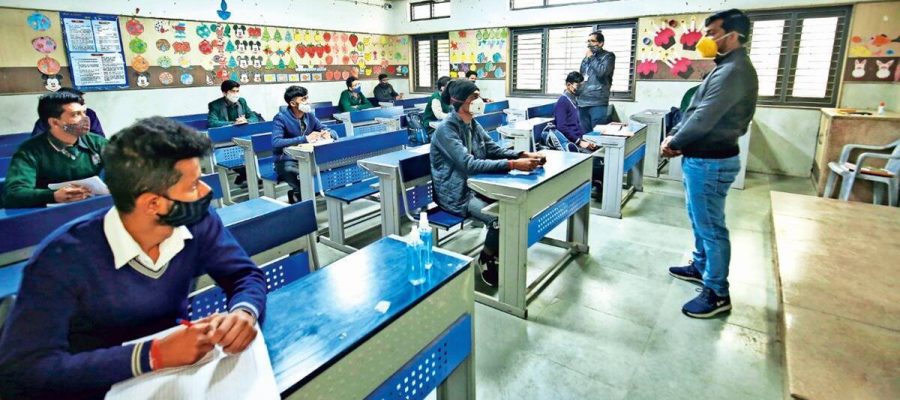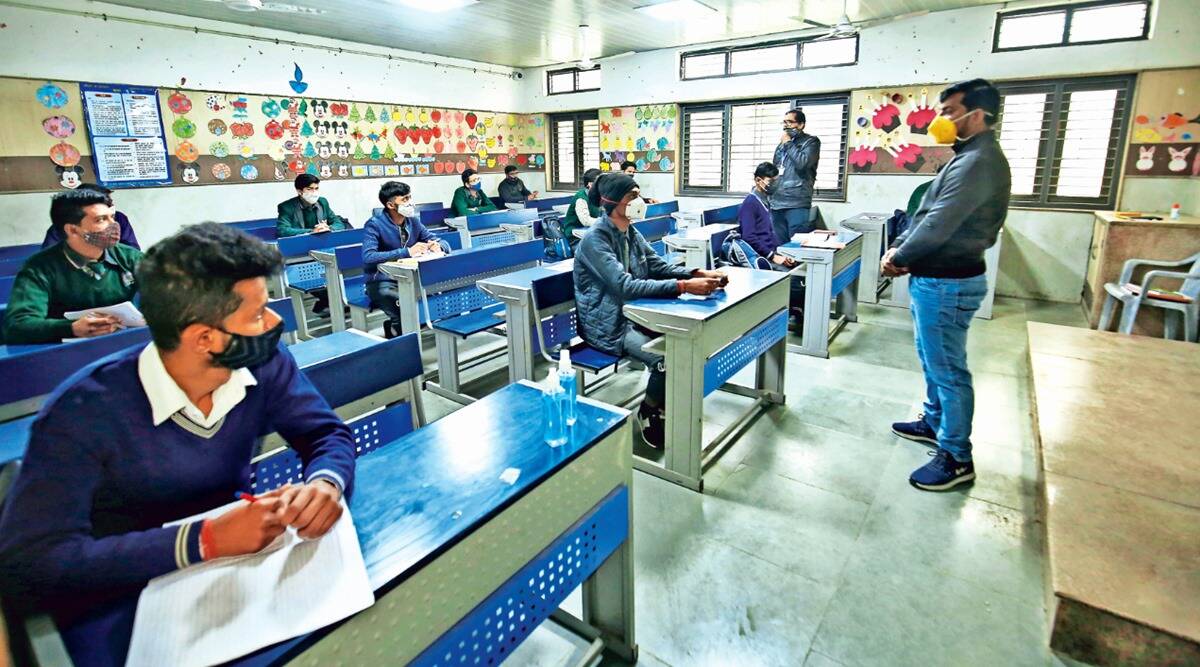Karnataka’s expert committee on Covid has advised the state government to reopen higher classes as well, on the condition that they be discontinued if the TPR in the region crosses two per cent.
Schools in a few districts in Karnataka will open for classes IX and X from August 23. According to the guidelines issued by the Education Department Monday, offline classes will resume only in districts where the test positivity rate (TPR) is below 2 per cent.
Only half-day classes will be held in private, government aided and unaided schools, that too in the morning. Karnataka’s expert committee on Covid has advised the state government to reopen higher classes as well, on the condition that they be discontinued if the TPR in the region crosses two per cent.
What are the guidelines?
- The Education Department has made it mandatory for all students to get a letter of approval from their parents and an undertaking that the child has no Covid-19 symptom.
- Students must bring water and food from home. Schools must have a provision to supply hot water.
- Online options must be kept open for students who do not wish to attend school. “Students must be called in batches. Classes will be
- held between 10 am and 1.30 pm from Monday to Friday and 10 am to 12.50 pm on Saturdays,” the guidelines state.
- The Department has suggested that, depending on the strength of the school, the students can be summoned in small groups of 10-15
- in up to eight batches to ensure that social distancing is maintained.
- Students in Class VIII will have online classes post lunch until further orders, the Education Department said.
Standard Operating Procedures (SOPs) for schools
- Schools must be cleaned and disinfected a week before classes commence.
- Ensure clean drinking water, any leftover stagnant water in tanks must be cleaned and the tanks refilled with fresh water.
- Use 1 per cent hypochlorite solution to clean toilets.
- Use 0.5 per cent chlorine or 1 per cent hypochlorite solution to clean surfaces and mop floors in classes, staff rooms, principal’s chamber, labs and libraries.
- Kitchens under Akshara Dasoha or any mid-day meal scheme to be deep-cleaned and utensils washed thoroughly.
- Draw squares at a distance of six feet each at the school entrance and ensure that children maintain social distancing.
- Keep all entrances open to avoid crowding on the school premises.
- Posters on maintaining social distancing and hand sanitisation should be put up inside the school campus.
- If any child has a cough, fever or running nose, he/she is to be isolated, parents informed and the child sent back home.
- Schools should keep track of children’s health every day.
- One or two children to be seated in each bench based on its length. Seats must be marked and a safe distance maintained between benches.
- Schools should ensure that students do not unnecessarily touch items like duster, chalk, books, etc and also make sure that they do not physically touch each other.
- Ensure students follow hygiene in toilets and mandatorily wash hands after using it.
- Maintain social distancing in school buses as well.
- It is mandatory for all teaching and non-teaching staff as well as the transport section staff to wear masks.
What are the SOPs for teachers and students?
- Masks are mandatory for all members of the staff. Teachers aged above 50 are recommended to use a face shield as well.
- Staff members need to sanitise their hands regularly and must have taken at least one dose of the vaccine.
- Ensure no symptomatic teacher comes to school – the department must be informed in such cases. Teachers must carry an RT-PCR test report not older than 3 days.
- Parents, School Development and Monitoring Committee (SDMC) members, donors, etc will only be allowed to enter the school office at designated hours.
- Appoint one teacher in the school as nodal officer to ensure guidelines are followed.
- No activity to be conducted which involves children standing in groups.
- Students must not touch any unidentified object on their way to school and refrain from consuming any unhygienic food on their way to school or while returning home.
- Students must wear masks at all times. Disposable masks must be discarded after a day’s use. If using cotton masks, ensure it is washed every day.
- Ensure safe disposal of used masks by staff and students.
- No sharing of notes, pens or stationery in school.
Other guidelines:
- Inform the School Development and Monitoring Committee about measures taken and communicate the same to parents.
- Seek the help of donors in case funds are required to purchase masks, sanitisers, soap, etc.
- Identify a doctor in the school’s vicinity and keep in touch with him/her.
- If needed seek help from the civic body to clean the school premises.
Source: Read Full Article



